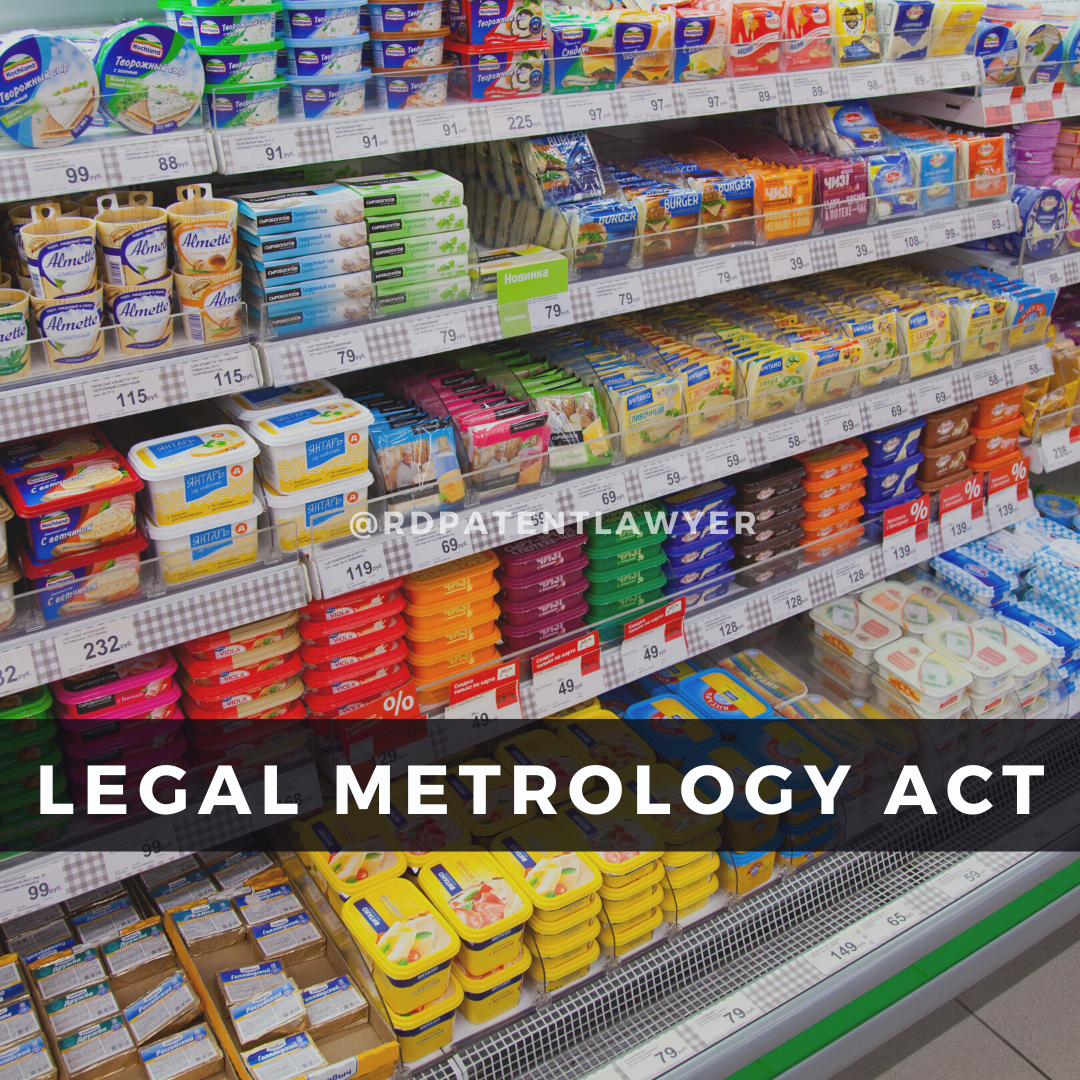
Companies selling products via online marketplace are required to comply with the provisions of the Legal Metrology Act. The legal implications are crucial for both, the sellers and the eCommerce platform, which is categorized as an intermediary under the provisions of the IT Act. With the exponential increase in online shopping transactions, the laws meant for consumer protection and eCommerce activities have gained much prominence among all stakeholders. Essentially, the provisions of the legal metrology act require correct marking of information pertaining to patents, trademarks, designs, and other intellectual property rights.

Legal Metrology means a system of treating units of weights and measurements. It is used as a method for weighment and measurement and weighing and measuring instruments in relation to all the products and services related to mandatory technical and legal requirements which have the objects of ensuring public guarantee from the point of view of security and accuracy of the weights and measurements. The ways of measuring the weights are known as metrology and regulating the system of measurement of weights and measures is known as the system of legal metrology.
In order to ensure full compliance, the company needs to conduct thorough audits on a regular basis to keep a check on the compliance before a notice is received. Once the notice is received, the company needs to be pro-active in filing of the responses to avoid contamination in the proceedings of other jurisdictions and also to avoid the initiation of court proceedings. The company also needs to reassess of all the offences in the jurisdiction where notice is received and other jurisdictions as well. Post which the company needs to check the possibility of clubbing of offences. In the parallel, the company also needs to ensure that it is adopting the correct measures to mitigate further risks. In case the company feels there is a breach, then the offences can be compounded and in case there is no breach, the company can contest it by way of appeal to the Controller or can take other recourse before the High Court.
The Indian metrology system is governed under the Legal Metrology Act, 2009. It deals with the various methods and units of weights and measurement in compliance with the mandatory legal and technical standards. This is done to ensure the public guarantee to further ensure public security and accuracy of weighing and measuring different types of goods.
The Legal Metrology Act, 2009, was introduced in India to replace the Standard of Weights and Measurements Act, 1976 and the Standards of Weights and Measures (Enforcement) Act, 1985. The Act came into force on April 1, 2011. This Act was brought into force with the aim of standardizing and enforcing the set standards of weights and measures, to regulate the trade and commerce in the weights, measures and other goods and products sold by the weight, measure and number and to regulate other connected matters.
Between the acts of 1975 and 1985, a lot of discrepancies such as the classification of offenses as compoundable and non-compoundable, summary, and regular trials were noticed, and therefore, these acts could not be proceeded with. The emergence of the Act of 2009 was the result of recommendation of the Standing Committee on the Food, Consumer Affairs and Public distribution in 2005-2006. In its recommendations the committee was very focused on getting both the legislations combined into one for better and efficient legislation in place.
The 1976 Act, under its provision of section 63, a second offence was punishable with fine and imprisonment whereas under the Act of 2009, the second offence is punishable with fine or imprisonment. This was amended keeping in mind that all the directors of a company or all the partners of a firm may not be responsible for the offence and hence, should not be prosecuted for the violation of the Legal Metrology Act, 2009. Section 49 of the Act, states that a director or partner can be nominated against whom the criminal case can be started.
There are several rules and regulations that came after the Act for updated methods of weighing weights and measures. These rules include, The Legal Metrology (Packed Commodities) Rules, 2011, which were brought into force to regulate the packaged goods and provide a set of the way the declarations on the packaged commodity meant to be and what it must contain. The rules further include, The Legal Metrology (Approval of Models) Rules, 2011, The Legal Metrology (Numeration) Rules, 2010, The Legal Metrology (General) Rules, 2011, The Legal Metrology (National Standards) Rules, 2011, The Indian Institute of Legal Metrology Rules, 2011, and, The Legal Metrology (Government Approved Test Centre) Rules, 2013
Important Definitions in Legal Metrology Laws
Packer: an important definition as defined under the Regulation 2(g) of the Rules, is that of a packer. A Packer is a person who or which is involved in the pre-packing of the commodity in any bottle, tin, wrapper, or otherwise, in units suitable for sale whether in wholesale or in retail.
Manufacturer: as per Section 2(i) of the Act, the “manufacturer” in relation to any weight or measure, indicates towards or means that a person who is involved in manufacturing of weights or measures, manufacturing of one or more parts and acquire other parts or such weight or measure after assembling those parts, or does not manufacture the parts and acquires other parts of such weights or measures but assembles parts differently or through others and claims the end product to be a weight or a measure manufactured by himself or itself, as the case may be, or puts or causes to be put, his own mark on any complete weight or measure made or manufactured by any other person and claims such product to be a weight or measure made or manufactured by any other person and claims such product to be a weight or measure made or manufactured by himself or itself as the case may be.
Dealer: the Legal Metrology Act, under its section 2(b) defines dealer as a person who carries out the business of buying, selling, supplying, distributing of any such weight or measure in exchange for either cash or for deferred payment or for commission, remuneration, or other valuable consideration and includes a commission agent, an importer, a manufacturer, who sells, supplies, distributes, or otherwise delivers any weight or measure manufactured by him to any person other than the dealer.
Importer: an importer is defined as a person, individual or a firm or a legal entity that brings the goods or causes the goods to be brought into the country from a foreign country into the customs territory.
Repairer: as defined under the act, under section 2(p), a repairer is a person who who repairs a weight or measure and includes a person who adjusts, cleans, lubricates or paints any weight or measure or renders any other service to such weight or measure to ensure that such weight or measure conforms to the standards established by or under this Act.
Mandatory Registration
Regulation 27 of the Rules mentions that every manufacturer, packer, or importer is required to mandatorily obtain a registration by filing an application with the Director or the Controller along with submission of its particulars. It also includes but is not limited to name and other personal details such as the address of the premises, name of the commodity etc. along with the payment details of the goods.
The Legal Metrology Act, 2009, mentions about the offences and the penalties of such offences under the Act. It mentions about the penalties under Chapter V of the Act. Section 27 of the Act provides penalty for the manufacture of weights or measures that are non-standardized. Such manufacture of non-standard weights and measures is punishable with a fine up to Rs. 20,000. It also states the punishment for the sale of such non-standardized weights and measures as imprisonment for a term up to 3 years or with fine or both.
Another section that talks about the penalties is section 36(1) of the Act. This section of the Act provides for the penalty for offence of manufacturing, selling, packaging, distributing, and importing. The penalty for manufacturing of non-standardized packages as a fine which may extend upto Rs. 25,000/- and for the second offence of selling the non-standardized packages, the penalty is a fine which may extend upto Rs. 50,000/- and for all the subsequent offences of packaging, distributing and importing of the non-standardized packages, penalty may be extended for a fine which will be nothing less than Rs 50,000/- and which may also extend to Rs. 1,00,000/- or with an imprisonment term which may extend to one year or with both.
Another sub-section of the Section 36 is Section 36(2) of the Legal Metrology Act talks about the punishment for manufacturing or packing or importing any pre-packaged commodity with error in net quantity as may be prescribed. The punishment as prescribed under this section may be a fine of not less than Rs. 10,000/- but which may extend to a Rs. 1,00,000/- or with imprisonment for a term which may extend to one year or with both.
Section 38 of the Legal Metrology Act, 2009 provides a penalty for the non-registration of the importer of weight. The punishment is with the fine that may extend to Rs. 25,000/- and for the non-registration of the importer of measures is with the imprisonment for a term which may extend to 6 months or with fine or with both. Regulation 32 of the Rules imposes penalty on the manufacturer, packer or importer of the commodities for the non-registration under the provisions of the Rules or contravention of any other Rules.
The Act mentions about the Offences under various Sections. Section 48 of the Legal Metrology Act, 2009 provides for the compoundable offences. It states that some of the offences may be compounded either before or after the institution of a prosecution on payment of a prescribed sum. However, no offence can be compounded if the same offence or a similar offence can be committed earlier by the person within 3 years of date of first offence which was compounded.
The Act also discusses in detail about the Offences by the Companies. In case of companies, they need to nominate a person who will be held responsible for the conduct of the company and the actions taken by the company. This needs to be communicated to the Director of the Legal Metrology or the concerned authority/controller. In case of no person being nominated by the company, then the person responsible for the operations of the company will be held responsible for the actions taken by the company. The company may be directed by the Court to publish its name along with the offence committed in the newspaper at their own cost. The provision of appeal is also mentioned in the Act. Appeals can be filed to the next higher authority against all the decisions or orders of an officer of legal metrology within 60 days from the day of the passing of the order or decision.
There are a lot of business risks involved in the metrological activities. Let us look at how the risk can even lead to a business fail in the longer run. The biggest and the most significant risk involved in this business is the risk of cancellation of the license granted to the manufacturer, dealer, importer, or packer. Let us see the circumstances in which such individuals might have to face business risks.
If the Controller under this Act, finds out through any mechanism that the information provided by the manufacturer, material provider for the purpose of obtaining a license has been reported falsely then he has the authority to suspend the license of such manufacturer, importer, dealer or packer provided that such manufacturer, importer, dealer or packer has been provided the opportunity to defend themselves against the same cause and have provided sufficient cause for doing such an act.
As mentioned under the Act, if the manufacturer, importer, dealer, or packer has made an incorrect statement or false statement or has contravened the law in place in order to obtain the license, the controller if satisfied regarding the same has the power to inquire into such matter. Therefore, once the controller becomes completely satisfied regarding the same, he can also cancel such license of the manufacturer, distributor, importer, dealer, or packer. In such a situation, the manufacturer, importer, distributor, dealer, or packer should be provided a reasonable opportunity to defend themselves before the cancellation of the license.
If the license of the distributor, manufacturer, importer, dealer, or packer has been suspended, such license should be stopped. They cannot continue to function as such licensee and not resume business until the order of suspension has been cancelled.
Once the license of such an individual stands cancelled or suspended, such license has to be submitted to the authority by whom such license was issued. Once, the license has been suspended, it is within a period not exceeding three months authorize the authority concerned to dispose of the weights or measures which were in his possession, custody or control on the date of suspension. In case, this step is not performed then the controller or the authority responsible for the suspension, shall seize and dispose of the said weights and measures in a manner prescribed.
If any consumer is aggrieved, then they can file a complaint to the controller of Legal Metrology or assistant controller or in the office of inspector of Legal Metrology or in their concerned district/sub-division office. Aggrieved person can also file a complaint in consumer courts. These courts might be at a district, state, or a national forum. If a complaint must be lodged against an individual who is an official, then the complaint can also be filed with the Controller of the Legal Metrology.
Once the complaint is filed then the first step towards the proceedings under the Legal Metrology Act is “Inspection”. It is done by the inspector. Once research is complete, the inspector then proceeds towards the inspection visit. If the inspection is driven by state level, the procedure differs from state to state but this remains the general procedure. The inspector has the power to seize goods that are illegal and non-standardized measures according to the Act. When on inspection visits the inspector finds such goods that are prohibited under the Act, the second stage i.e. “Seizure” naturally flows.
If such goods are found and seizure, then a Notice is issued according to the state patterns. The notice will be issued by the inspector of the jurisdiction where the offence has taken place. This inspector has the power to escalate it to the concerned authority. The notice must be replied to immediately for preventing the contamination of evidence.
If the offence is accepted by the company, then the offences can be clubbed. This happens only when multiple inspectors have issued parallel notices. Then the company or the offender can make an application to the Controller or to the Zonal Officer to club the offences under different notices. The act does not mention specifically which all offences can be clubbed, therefore it depends upon case to case. Clubbing of the offences is governed by the State-specific guidelines and practices. Clubbing of offences is typically to be done after receiving the notices but prior to compounding.
The Legal Metrology Act provides for the provision of Compounding of Offence under the Act. If the company does not accept the offences mentioned in the notice by the inspector, then a response to the same must be filed. In this situation the company needs to be pro-active in replying to such a notice. When such a response is filed, then the next step is the hearing. Post hearing if found guilty, then the company will be given the penal orders depending upon the offence mentioned under the Act. The company, however, has the power to appeal to the controller or to the state government as applicable. If the reply to such a notice is not filed, then the inspector can file the case before the Judicial Magistrate. Sometimes, even after the proceedings begin before the judicial magistrate there remains a possibility of compounding the offences.
There are certain provisions in the Legal Metrology Act, 2009 that are often considered overlapping with the provisions of IPC. Many a times there have arisen situations in the Supreme Court of India where such overlaps have been dealt with. The Supreme Court have observed that Section 3 of the Legal Metrology Act completely overrides the provisions of Chapter XIII of IPC in terms of the offences and penalties mentioned for the offences mentioned in the Act. The apex court also observed that if the offence is covered under the provisions of the Legal Metrology Act, then the accused cannot be charged for the same offence under provisions of chapter XIII of IPC. The Legal Metrology Act also clearly states under section 51 that the provisions of the IPC in so far as the offences related to the weights and measurements shall not apply to any offence which is punishable under the Act. However, for the offences such as fraud, criminal intention and criminal conspiracy shall be dealt with in accordance with the provisions mentioned under the IPC as the trial of these offences is not permitted under the Legal Metrology Act.
Read About Patent FIling Guide



